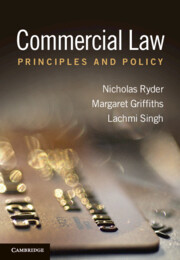Book contents
- Frontmatter
- Contents
- Preface
- List of abbreviations
- Table of Statutory Provisions
- Table of Cases
- Part 1 Agency
- Part 2 Sale of Goods and Services
- Part 3 International Trade and Sales
- Part 4 Tortious Liability for Defective Products
- Part 4 Chapter 1 Negligence and the Rise of Product Liability
- Part 4 Chapter 2 Product Liability under the Consumer Protection Act 1987
- Part 5 Unfair Commercial Practices
- Part 6 Banking and Finance Law
- Part 7 Consumer Credit
- Bibliography
- Index
- References
Part 4 Chapter 2 - Product Liability under the Consumer Protection Act 1987
from Part 4 - Tortious Liability for Defective Products
Published online by Cambridge University Press: 05 August 2012
- Frontmatter
- Contents
- Preface
- List of abbreviations
- Table of Statutory Provisions
- Table of Cases
- Part 1 Agency
- Part 2 Sale of Goods and Services
- Part 3 International Trade and Sales
- Part 4 Tortious Liability for Defective Products
- Part 4 Chapter 1 Negligence and the Rise of Product Liability
- Part 4 Chapter 2 Product Liability under the Consumer Protection Act 1987
- Part 5 Unfair Commercial Practices
- Part 6 Banking and Finance Law
- Part 7 Consumer Credit
- Bibliography
- Index
- References
Summary
Introduction
The Product Liability Directive was given effect in the United Kingdom via Part I of the Consumer Protection Act 1987. In passing the Act, Parliament took the opportunity to legislate for both product liability and product safety, reinforcing the indisputable link between the civil law consequences and criminal law liability for defective products. Criminal product safety controls prohibit producers from placing unsafe goods on the market, while compensation under product liability occurs where defective goods have caused injuries to product users. However, this chapter only deals with civil liability under Part I of the 1987 Act, criminal law controls being beyond the remit of this text.
Section 1(1) of the 1987 Act makes clear that Part I of the Act is to be construed so as to comply with the Product Liability Directive. This approach was confirmed in the decision in EC Commission v. United Kingdom when it was held that the development risk defence in section 4(1)(e) of the Act must be construed in line with the Directive even though the wording of the Act differs significantly from that of the Directive.
- Type
- Chapter
- Information
- Commercial LawPrinciples and Policy, pp. 298 - 332Publisher: Cambridge University PressPrint publication year: 2012



